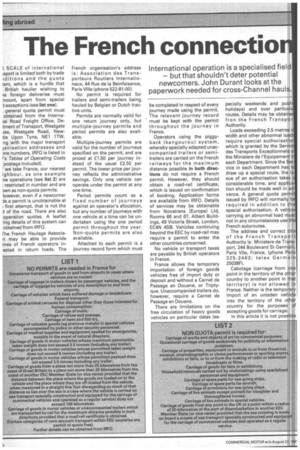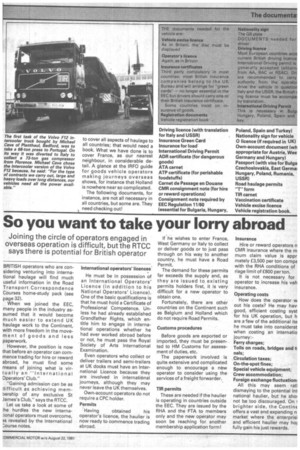The French connectio
Page 38

Page 39

If you've noticed an error in this article please click here to report it so we can fix it.
International operation is a specialised field — but that shouldn't deter potential newcomers. John Durant looks at the paperwork needed for cross-Channel hauls.
E. SCALE of international sport is limited both by trade Iditions and the quota Lem, which is a hurdle that
British haulier wishing to ce foreign deliveries must mount, apart from special -I exceptions (see list one).
. general quota permit must obtained from the Internaial Road Freight Office, Detm ent of Transport, Westgate Jse, Westgate Road, Newtle Upon Tyne, NE1 1TIN. ng with the major transport janisation addresses and )ne numbers, IRFO is listed in T's Tables of Operating Costs postage included).
we take France, our nearest ighbour, as one example ne operations (see list 2) are : restricted in number and are )wn as non-quota permits. lowever, even if a newcomer is a permit is unobtainable at first attempt, that is not the of the road. There are also .operation quotas. A leaflet 'ing details of this system can obtained from IRFO.
fhe French Haulage Associan may be able to provide mes of French operators inested in return loads. The French organisation's address is: Association des Transporteurs Routiers Internationaux, 44 Rue de la Beinfaisance, Paris Ville (phone 522-81-00).
No permit is required for trailers and semi-trailers being. hauled by Belgian or Dutch tractive units.
Permits are normally valid for one return journey only, but multiple-journey permits and period permits are also available.
Multiple-journey permits are valid for the number of journeys specified on the permit, and are priced at £1.50 per journey instead of the usual £2.50 per permit. The lower price per journey reflects the administrative savings. Only on vehicle can operate under the permit at any onetime.
Period permits count as a fixed number of journeys against an operator's allocation, but any number of journeys with one vehicle at a time can be undertaken using the one period permit throughout the year. Non-quota permits are also available.
Attached to each permit is a journey record form which must be completed in respect of every journey made using the permit. The relevant journey record must be kept with the permit throughout the journey in France.
Operators using the piggyback (kangourou) system, whereby specially adapted unaccompanied trailers or semitrailers are carried on the French railways for the maximum distance possible in both directions do not require a French permit. However, they should obtain a road-rail certificate, which is issued on confirmation of booking. Application forms are available from IRFO. Details of services may be obtainable from Novatrans (Europe) Ltd, Rooms 66 and 67, Albert Buildings, 49 Victoria Street, London, EC4N 4SB. Vehicles continuing beyond the EEC by road-rail may require a permit to enter the other countries concerned.
No vehicle or transport taxes are payable by British operators in France.
France allows the temporary importation of foreign goods vehicles free of import duty or deposit and without a Carnet de Passage en Douane, or Triptyque. Unaccompanied trailers do, however, require a Carnet de Passage en Douane.
There are limitations on the free circulation of heavy goods vehicles on particular dates (es
pecially weekends and publi holidays) and over particula routes. Details may be obtaine fron the French Transpor Authority.
Loads exceeding 2.5 metres i width and other abnormal load require special authorisatio which is granted by the Servic des Transports Exceptionnels o the Ministere de l'Equipement i each Department. Since the Ser vice in each Department has t draw up a special route, the is sue of an authorisation takes considerable time, and applica tion should be made well in ad vance. A general quota permi issued by IRFO will normally b required in addition to th special authorisation. A vehicl carrying an abnormal load must not in any circumstances use the French autoroutes.
The address and correct title of the French Transport Authority is: Ministere de Transport, 244 Boulevard St Germain, Paris Vile; France, (phone Paris 3 2 5-2 4 6 3; telex Germain 25038F).
Cabotage (carriage from one point in the territory of the other country to another point in that territory) is not allowed in France. Neither is the temporary import of an unladen vehicle into the territory of the other country for the purposes of accepting goods for carriage.
In this article it is not possible to cover all aspects of haulage to all countries; that would need a book. What we have done is to cover France, as our nearest neighbour, in considerable detail. A glance at the IRFO guide for goods vehicle operators making journeys overseas shows, for instance that Holland is nowhere near so complicated.
The following documents, for instance, are not all necessary in all countries, but some are. They need checking out! Driving licence (with translation for Italy and USSR) Insurance Green Card Insurance for load International Driving Permit ADR certificate (for dangerous goods) ATA carnet ATP certificate (for perishable foodstuffs) Carnet de Passage en Douane CMR consignment note (for hire or reward operations) Consignment note required by EEC Regulation 11/60 (essential for Bulgaria, Hungary,
Poland, Spain and Turkey) Nationality sign for vehicle 0 licence (if required in UK) Own-account document (wh appropriate for Austria, Wes. Germany and Hungary) Passport (with visa for Bulga Czechoslovakia, East Germal Hungary, Poland, Rumania, USSR)
Road haulage permits "T" form TIR carnet Vaccination certificate Vehicle excise licence Vehicle registration book.




























































